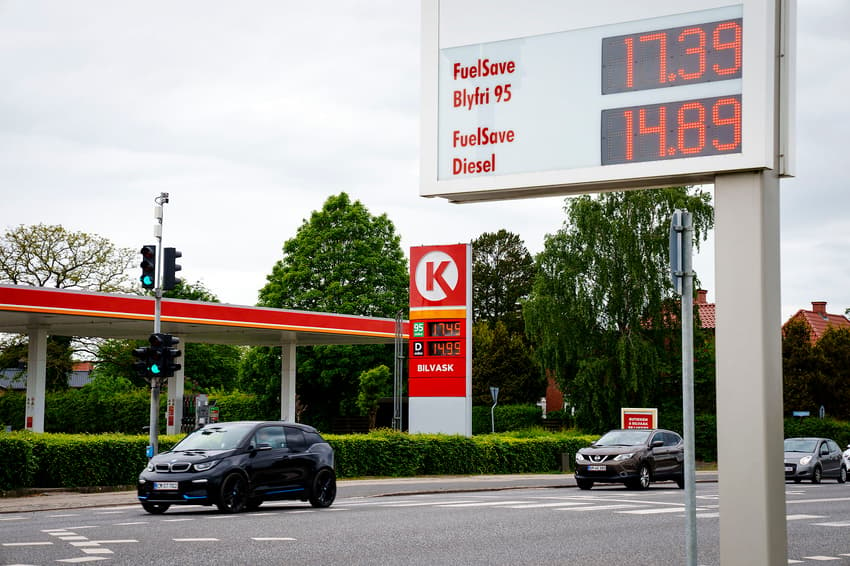Danish consumers ‘should get used to’ high petrol costs after EU’s Russian oil decision

Customers in Denmark can expect high petrol and diesel prices to continue for some time, an analyst said on Tuesday following the EU’s decision to further restrict oil imports from Russia.
EU member states agreed on Monday night to reduce oil imports from Russia by more than two thirds, in a new measure in response to Moscow’s invasion of Ukraine.
The decision means a continuation of high fuel prices for consumers in Denmark – petrol is currently at a historically high price of over 17 kroner per litre at the pump – according to a Danish analyst.
EU states including Denmark will have to find alternative supplies of oil, which will not be a straightforward undertaking, Jens Nærvig Pedersen, raw materials analyst with Danske Bank, told news wire Ritzau.
“Normal citizens should get used to the increases in petrol prices we have seen this year continuing in coming months or for the rest of the year,” Pedersen said.
“With the decision from the EU countries we should prepare to make do without large amounts of the oil we import from Russia,” he said.
“That means we have to go out and buy oil from other places. But there’s not much oil spare at the moment, so prices will be high,” he said.
Easing of Covid-19 restrictions in China is a further factor in rising prices, as the Asian power begins to reopen factories and industry and its energy demand goes up.
Reduced oil sale from Russia to Europe will mean demand increases in relation to supply.
“Russia is one of the world’s biggest oil producers and exporters so it’s not a simple matter of shutting off imports from Russia and looking elsewhere for alternative,” Pedersen said.
“That’s a lot of oil you have to go out and find,” he said.
EU leaders voted Monday evening to ‘ban' the use of Russian oil imported by ship by the end of 2022. That accounts for about two-thirds of Russia’s total oil exports to the EU.
The carveout for Russian oil imported via pipes is a concession to Hungarian Prime Minister Viktor Orbán, who has argued that land-locked Hungary can’t as easily switch to oil from other sources as countries that have ports.
READ ALSO: Danish energy company refuses to pay for Russian gas in rubles
Comments
See Also
EU member states agreed on Monday night to reduce oil imports from Russia by more than two thirds, in a new measure in response to Moscow’s invasion of Ukraine.
The decision means a continuation of high fuel prices for consumers in Denmark – petrol is currently at a historically high price of over 17 kroner per litre at the pump – according to a Danish analyst.
EU states including Denmark will have to find alternative supplies of oil, which will not be a straightforward undertaking, Jens Nærvig Pedersen, raw materials analyst with Danske Bank, told news wire Ritzau.
“Normal citizens should get used to the increases in petrol prices we have seen this year continuing in coming months or for the rest of the year,” Pedersen said.
“With the decision from the EU countries we should prepare to make do without large amounts of the oil we import from Russia,” he said.
“That means we have to go out and buy oil from other places. But there’s not much oil spare at the moment, so prices will be high,” he said.
Easing of Covid-19 restrictions in China is a further factor in rising prices, as the Asian power begins to reopen factories and industry and its energy demand goes up.
Reduced oil sale from Russia to Europe will mean demand increases in relation to supply.
“Russia is one of the world’s biggest oil producers and exporters so it’s not a simple matter of shutting off imports from Russia and looking elsewhere for alternative,” Pedersen said.
“That’s a lot of oil you have to go out and find,” he said.
EU leaders voted Monday evening to ‘ban' the use of Russian oil imported by ship by the end of 2022. That accounts for about two-thirds of Russia’s total oil exports to the EU.
The carveout for Russian oil imported via pipes is a concession to Hungarian Prime Minister Viktor Orbán, who has argued that land-locked Hungary can’t as easily switch to oil from other sources as countries that have ports.
READ ALSO: Danish energy company refuses to pay for Russian gas in rubles
Join the conversation in our comments section below. Share your own views and experience and if you have a question or suggestion for our journalists then email us at [email protected].
Please keep comments civil, constructive and on topic – and make sure to read our terms of use before getting involved.
Please log in here to leave a comment.